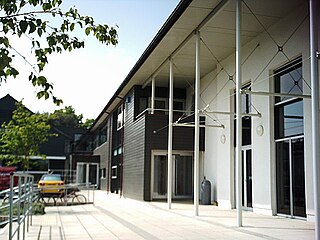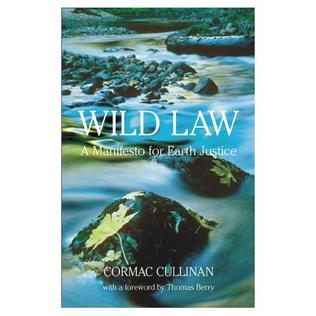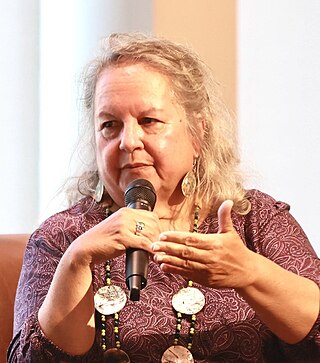Related Research Articles

Totnes is a market town and civil parish at the head of the estuary of the River Dart in Devon, England, within the South Devon Area of Outstanding Natural Beauty. It is about 5 miles (8.0 km) west of Paignton, about 7 miles (11 km) west-southwest of Torquay and about 20 miles (32 km) east-northeast of Plymouth. It is the administrative centre of the South Hams District Council.
Agroecology is an academic discipline that studies ecological processes applied to agricultural production systems. Bringing ecological principles to bear can suggest new management approaches in agroecosystems. The term can refer to a science, a movement, or an agricultural practice. Agroecologists study a variety of agroecosystems. The field of agroecology is not associated with any one particular method of farming, whether it be organic, regenerative, integrated, or industrial, intensive or extensive, although some use the name specifically for alternative agriculture.

Dartington Hall in Dartington, near Totnes, Devon, England, is an historic house and country estate of 1,200 acres (4.9 km2) dating from medieval times. The group of late 14th century buildings are Grade I listed; described in Pevsner's Buildings of England as "one of the most spectacular surviving domestic buildings of late Medieval England", along with Haddon Hall and Wingfield Manor. The medieval buildings are grouped around a huge courtyard; the largest built for a private residence before the 16th Century, and the Great Hall itself is the finest of its date in England. The west range of the courtyard is regarded nationally as one of the most notable examples of a range of medieval lodgings. The medieval buildings were restored from 1926 to 1938.

Satish Kumar is an Indian British activist and speaker. He has been a Jain monk, nuclear disarmament advocate and pacifist.Now living in England, Kumar is founder and Director of Programmes of the Schumacher College international center for ecological studies, and is Editor Emeritus of Resurgence & Ecologist magazine. His most notable accomplishment is the completion, together with a companion, E. P. Menon, of a peace walk of over 8,000 miles in June 1962 for two and a half years, from New Delhi to Moscow, Paris, London, and Washington, D.C., the capitals of the world's earliest nuclear-armed countries. He insists that reverence for nature should be at the heart of every political and social debate.

Falmouth University is a specialist public university for the creative industries based in Falmouth and Penryn, Cornwall, England. Founded as Falmouth School of Art in 1902, it was later known as Falmouth College of Art and Design and then Falmouth College of Arts until 2012, when the university college was officially granted full university status by the Privy Council.

Dartington College of Arts was a specialist arts college located at Dartington Hall in the south-west of England, offering courses at degree and postgraduate level together with an arts research programme. It existed for a period of almost 50 years, from its foundation in 1961, to when it closed at Dartington in 2010. A version of the College was then re-established in what became Falmouth University, and the Dartington title was subsequently dropped. The College was one of only a few in Britain devoted exclusively to specialist practical and theoretical studies in courses spanning right across the arts. It had an international reputation as a centre for contemporary practice. As well as the courses offered, it became a meeting point for practitioners and teachers from around the world. Dartington was known not only as a place for training practitioners, but also for its emphasis on the role of the arts in the wider community.
Maurice Anthony Ash was an environmentalist, writer, farmer, and planner. He was chairman of the Town and Country Planning Association and of the Dartington Trust and founder/chairman of mindfulness & nature charity The Sharpham Trust.
Resurgence & Ecologist is a British bi-monthly magazine covering environmental issues, engaged activism, philosophy, arts and ethical living. In 1973 – and for the next 43 years – the Editor-in-Chief was former Jain monk and author Satish Kumar. Kumar stepped aside from his editing role to become Editor Emeritus on his 80th birthday in 2016. The current editor is Susan Clark. The magazine combines the former Resurgence magazine, edited by Kumar, with The Ecologist, which in recent years has been published online only.
Martin Crawford is a British author who is the founder and director of the Agroforestry Research Trust.

Wild law are the human laws which are consistent with Earth jurisprudence. A wild law regulates human behavior that privileges maintaining the integrity and functioning of the whole Earth community in the long term over the interests of any species at a particular time.

Wild Law: A Manifesto for Earth Justice is a book by Cormac Cullinan that proposes recognizing natural communities and ecosystems as legal persons with legal rights. The book explains the concept of wild law, that is, human laws that are consistent with earth jurisprudence. Foreworded by Thomas Berry, the book was published by Green Books in November 2003 in association with The Gaia Foundation, London. It was first published in South Africa, the author's home country, in August 2002 by Siber Ink.

Robin Wall Kimmerer is a Potawatomi botanist, author, and the director of the Center for Native Peoples and the Environment at the State University of New York College of Environmental Science and Forestry (SUNY-ESF).
The balance of nature, also known as ecological balance, is a theory that proposes that ecological systems are usually in a stable equilibrium or homeostasis, which is to say that a small change will be corrected by some negative feedback that will bring the parameter back to its original "point of balance" with the rest of the system. The balance is sometimes depicted as easily disturbed and delicate, while other times it is inversely portrayed as powerful enough to correct any imbalances by itself. The concept has been described as "normative", as well as teleological, as it makes a claim about how nature should be: nature is balanced because "it is supposed to be balanced". The theory has been employed to describe how populations depend on each other, for example in predator-prey systems, or relationships between herbivores and their food source. It is also sometimes applied to the relationship between the Earth's ecosystem, the composition of the atmosphere, and weather.

Kingsley School Bideford is a co-educational independent school in Bideford, Devon. The school was founded in 1884 as Edgehill College, and merged with Grenville College in 2009 to form Kingsley.
King Edward VI Community College (KEVICC) is a coeducational secondary school and sixth form located in Totnes, Devon, England. It is located in the Dart Valley on the A385 Ashburton Road and serves Totnes and the surrounding area. It has a large campus with around 900 students, 200 of whom are at the Kennicott Sixth Form centre adjoining the main site.
Soundart Radio 102.5 fm is an art radio station based in Dartington, Totnes, Devon, UK. Founded as a student radio station in 2006 by two graduates of Dartington College of Arts, Nell Harrison and Lucinda Guy, the station moved onto a full-time Community Radio Licence in February 2009 broadcasting to a 5 km radius around the transmitter at Dartington Hall.
The Agroforestry Research Trust (ART) is a British charitable incorporated organisation that researches temperate agroforestry and all aspects of plant cropping and uses, with a focus on tree, shrub and perennial crops. It produces several publications and a quarterly journal, and sells plants and seeds from its forest gardens.

Rob Hopkins is an activist and writer on environmental issues, based in Totnes, England. He is best known as the founder and figurehead of the Transition movement, which he initiated in 2005. Hopkins has written six books on environmentalism and activism.

The Lilongwe University of Agriculture and Natural Resources (LUANAR) is a university outside Lilongwe, Malawi. It was formed in 2011 by a merger between Bunda College of Agriculture of the University of Malawi and Natural Resources College (NRC).
References
- ↑ "The age of fake food: a conversation with Satish Kumar and Vandana Shiva". LifeGate. 28 January 2022. Retrieved 5 December 2022.
- ↑ "2019 Finalists". Green Gown Awards. Retrieved 13 November 2019.
- ↑ "Horticulture Programmes". Schumacher College. 17 May 2018. Retrieved 13 November 2019.
- ↑ "Schumacher College celebrates 25 years of ecological teaching". The Ecologist. Retrieved 26 April 2017.
- ↑ "Schumacher College". Higher Education at Dartington Trust. Retrieved 5 December 2022.
- ↑ "Short Courses". Dartington Trust. Retrieved 5 December 2022.
- ↑ "Sarvodaya, or bioregionalism, is the solution to the ills of capitalism, socialism, and neoliberalism". The Hindu. 9 August 2017. ISSN 0971-751X . Retrieved 5 December 2022.
- ↑ "Dartington college welcomes undergrads back for first time in 12 years | totnes-today.co.uk". Totnes Times. 5 October 2022. Retrieved 5 December 2022.